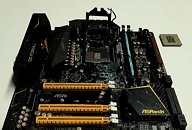- Joined
- Oct 9, 2007
- Messages
- 47,670 (7.43/day)
- Location
- Dublin, Ireland
| System Name | RBMK-1000 |
|---|---|
| Processor | AMD Ryzen 7 5700G |
| Motherboard | Gigabyte B550 AORUS Elite V2 |
| Cooling | DeepCool Gammax L240 V2 |
| Memory | 2x 16GB DDR4-3200 |
| Video Card(s) | Galax RTX 4070 Ti EX |
| Storage | Samsung 990 1TB |
| Display(s) | BenQ 1440p 60 Hz 27-inch |
| Case | Corsair Carbide 100R |
| Audio Device(s) | ASUS SupremeFX S1220A |
| Power Supply | Cooler Master MWE Gold 650W |
| Mouse | ASUS ROG Strix Impact |
| Keyboard | Gamdias Hermes E2 |
| Software | Windows 11 Pro |
It is already established that the incompatibility between Intel's 8th and 9th generation Core socket LGA1151 processors and Intel's 100-series and 200-series chipset motherboards is artificial, and that with the right BIOS modding, you can get the newer processors to work on the older motherboards. Finnish overclocker "Luumi" made a video demonstration of an i9-9900K successfully overclocking to 5.50 GHz all-core on an ASRock Z170M OC Formula micro-ATX motherboard. The overclocked processor is CineBench and Prime95 stable.
Officially, Intel carved out the 300-series chipset platform to ensure its "Coffee Lake" 6-core processors are given motherboards with a sufficiently powerful VRM setup to keep up with the increased core-count, such as this motherboard with its astoundingly powerful VRM. Unofficially, it's believed Intel created the boundary between 300-series and older LGA1151 platforms, just so motherboard vendors are assured of selling new product lines every two generations of Intel processors. In contrast, AMD's AM4 platform already supports three generations of processors, and is scheduled to support future generations running up to 2020.

Lummi's video presentation follows.
View at TechPowerUp Main Site
Officially, Intel carved out the 300-series chipset platform to ensure its "Coffee Lake" 6-core processors are given motherboards with a sufficiently powerful VRM setup to keep up with the increased core-count, such as this motherboard with its astoundingly powerful VRM. Unofficially, it's believed Intel created the boundary between 300-series and older LGA1151 platforms, just so motherboard vendors are assured of selling new product lines every two generations of Intel processors. In contrast, AMD's AM4 platform already supports three generations of processors, and is scheduled to support future generations running up to 2020.

Lummi's video presentation follows.
View at TechPowerUp Main Site




 Thankfully it is modded and will take a 9900k
Thankfully it is modded and will take a 9900k 


